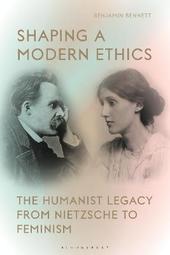
|
Shaping a Modern Ethics: The Humanist Legacy from Nietzsche to Feminism
Hardback
Main Details
| Title |
Shaping a Modern Ethics: The Humanist Legacy from Nietzsche to Feminism
|
| Authors and Contributors |
By (author) Professor Benjamin Bennett
|
| Physical Properties |
| Format:Hardback | | Pages:216 | | Dimensions(mm): Height 234,Width 156 |
|
| Category/Genre | Ethics and moral philosophy |
|---|
| ISBN/Barcode |
9781350122857
|
| Classifications | Dewey:171.2 |
|---|
| Audience | | Tertiary Education (US: College) | |
|---|
|
Publishing Details |
| Publisher |
Bloomsbury Publishing PLC
|
| Imprint |
Bloomsbury Academic
|
| Publication Date |
6 February 2020 |
| Publication Country |
United Kingdom
|
Description
Is there any such thing as a single ethical system to which all human beings could conceivably subscribe? The short answer is no; and most people, being tolerant, would probably agree with this answer. Yet most people, precisely in being tolerant, also subscribe to an idea of "human rights" which presupposes just such a universal ethics. This basic question of ethics is similarly treacherous when approached on a higher technical level. Specialists have long recognized that Kant's categorical imperative is neither theoretically nor practically tenable. But efforts to revive and repair the Kantian project-including especially the monumental work of Jurgen Habermas-have all themselves been theoretically questionable, while developing a complexity that makes them impractical. Must we then simply do without ethics in the sense of a universal ethical method? By way of a close study of literary and philosophical texts, from Freud to Machiavelli, Benjamin Bennett shows why the failure of a universal or propositional ethics is indeed unavoidable. He uncovers a modern non-propositional ethics that cannot be grasped in a single theoretical move but can only be approached as a collection of instances of a modern ethical "we", three key examples of which Bennett explores in this book: - The "we" of irony, whose speakers share a strictly preter-verbal knowledge which is concealed in their actual utterances - The insistent exclusive "we" of a group that has neither its own physical locality nor even a clear intellectual identity, comparable to the "we" of Jews in the diaspora - The "we" of feminism, a separate "we" from that embracing people who happen to have been born women.
Author Biography
Benjamin Bennett is Kenan Professor of German and Comparative Literature, and Interim Chair of the Department of Germanic Languages & Literatures at the University of Virginia, USA.
ReviewsBenjamin Bennett's Shaping A Modern Ethics offers a series of provocative case studies, focusing on Lessing and Freud, on Nietzsche and Rorty, on Habermas and Wittig. Bennett introduces us to Enlightenment thought and a post-Enlightenment relativism that also re-centers our attention towards Jewish philosophy and feminist thought. This is a very timely book that will be appreciated by students of philosophy and literature alike. -- Liliane Weissberg, Christopher H. Browne Distinguished Professor in the School of Arts & Sciences, University of Pennsylvania, USA One of the foremost literary scholars of our times, Benjamin Bennett, with his signature flair and brilliance, argues in his newest book for the ethical significance of literature-precisely when it defies all ethical propositions. In the tradition of Leibniz, Lessing, Nietzsche, Kafka, Wittgenstein, and Bachmann, he resists the clamor for extrinsic guidelines and the authoritarian injunction to literal interpretation. Instead, Bennett celebrates the non-compliant, ironic, and experimental text. A refreshing voice! * Alice Kuzniar, Professor of German and English, University of Waterloo, Canada *
|